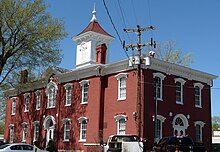Moore County, Tennessee
| Moore County, Tennessee | |
|---|---|

Moore County Courthouse in Lynchburg
|
|
|
Location in the U.S. state of Tennessee |
|
 Tennessee's location in the U.S. |
|
| Founded | 1871 |
| Named for | William Moore, state legislator |
| Seat | Lynchburg |
| Largest city | Lynchburg |
| Area | |
| • Total | 130 sq mi (337 km2) |
| • Land | 129 sq mi (334 km2) |
| • Water | 1.2 sq mi (3 km2), 0.9% |
| Population | |
| • (2010) | 6,362 |
| • Density | 49/sq mi (19/km²) |
| Congressional district | 4th |
| Time zone | Central: UTC-6/-5 |
| Website | Government & Education Services |
Moore County is a county located in the U.S. state of Tennessee. As of the 2010 census, the population was 6,362, making it the third-least populous county in Tennessee. It forms a consolidated city-county government with its county seat of Lynchburg. With 130 square miles (340 km2), it is the second-smallest county in Tennessee, behind only Trousdale. The county was created in 1871.
Moore County is part of the Tullahoma-Manchester, TN Micropolitan Statistical Area.
Moore County was established in 1871 from parts of Lincoln, Bedford and Franklin counties, and named in honor of General William Moore, an early settler and long-time member of the state legislature. The new county originally contained about 300 square miles, but Lincoln County sued and successfully reclaimed a portion of its land, reducing the new county's size.
Moore County has been home to whiskey distilleries since the 1820s. By 1875, fifteen distilleries were operating in the county. At the end of the 20th century, the Jack Daniel Distillery in Lynchburg was the county's primary source of revenue.
According to the U.S. Census Bureau, the county has a total area of 130 square miles (340 km2), of which 129 square miles (330 km2) is land and 1.2 square miles (3.1 km2) (0.9%) is water. It is the second-smallest county in Tennessee by area. The county is located partially on the rugged Highland Rim, and partially in the flatter Nashville Basin.
...
Wikipedia
